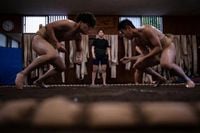The ancient sport of sumo, with its thunderous clashes and centuries-old traditions, is experiencing a quiet revolution. For hundreds of years, sumo’s sacred ties to Shinto rituals meant that women were strictly forbidden from entering the ring, let alone competing. Yet today, more than 600 women are stepping into the dohyo at the amateur level, shattering old taboos and forging a new path for generations to come.
This weekend, the world’s attention turns to Bangkok, Thailand, where female sumo wrestlers from Japan and beyond are preparing to compete at the Sumo World Championships. It’s a remarkable moment for a sport long defined by exclusion—and for the women who have persevered against the odds.
Since 2016, Tottori Jōhoku High School, located some 600 kilometers (about 370 miles) west of Tokyo, has emerged as a powerhouse for girls’ sumo. The school hosts Japan’s largest girls’ sumo club, and its weeklong training camps have become a magnet for aspiring wrestlers from across the country. The Associated Press recently documented their grueling preparations, capturing the sweat, discipline, and camaraderie that fuel these athletes’ dreams.
Inside the dojo, the scene is a whirlwind of activity. Wrestlers sweep the clay ring with brooms, apply training straps to their faces and feet, and hydrate with quick sips of water. After practice, they comb their hair, rinse their feet, and—true to sumo’s communal spirit—prepare dinner together. These rituals, both ancient and modern, bind the team in ways that transcend the sport itself.
Participation in girls’ sumo has more than doubled in recent years, according to Nana Kakuda, a 24-year-old coach and alumna of the Tottori Jōhoku program. Kakuda’s own journey in sumo began in elementary school, but she still remembers the sting of exclusion. Despite clinching her prefectural title, she was barred from entering a national tournament because the Tokyo venue permitted only boys. That moment, she says, didn’t break her spirit—it galvanized her. "That exclusion strengthened my will to promote women’s sumo," Kakuda explained, her determination as clear as ever.
For many, the path has been anything but smooth. Girls in sumo often face teasing—sometimes so relentless it drives them out of the sport. The pressure isn’t just external. Sumo’s traditions demand that men compete bare-chested in the iconic mawashi, a thick, folded loincloth. Women, however, must wear the mawashi over spandex shirts and bodysuits, a nod to cultural modesty and body image expectations. These differences, subtle yet significant, are a constant reminder of the barriers that remain.
Still, the tide is turning. At the Tachihi Holdings Women’s sumo club in Tokyo, 2023 world champion Airi Hisano trains alongside her coach, Toyonoshima Daiki. Hisano, 27, balances her rigorous practice schedule with a full-time job—a testament to the sacrifices and grit required of female athletes in a male-dominated arena. Her vision for the future is simple, yet profound: "I hope for a world where there’s no distinction between men and women in sumo, where girls can train freely and continue into adulthood." According to AP reporting, Hisano’s words resonate deeply with her peers, many of whom have faced similar hurdles.
It’s not just at the high school level where change is brewing. At Keio University Sumo Club—founded in 1919 and steeped in tradition—women and men now train side by side. Among the club’s trailblazers is 22-year-old Rio Hasegawa, the reigning 2024 middleweight world champion and the first female member in the club’s storied history. Hasegawa’s presence on the team is more than symbolic; it’s a signal that the old guard is yielding, however slowly, to a more inclusive vision of the sport.
What’s driving this surge in participation? For many, it’s a mix of personal ambition and a desire to break down barriers. The weeklong camps at Tottori Jōhoku High School are more than just training sessions—they’re crucibles where young women forge confidence, resilience, and lifelong friendships. The AP’s photo documentation reveals wrestlers supporting each other through punishing drills, sharing meals, and even resting together outside the dojo, exhausted but unbowed.
There’s also a sense of urgency. With the Sumo World Championships in Bangkok looming, the stakes have never been higher. For these athletes, the chance to represent Japan—and to stand shoulder to shoulder with the world’s best—offers a rare moment in the spotlight. The preparations are intense. Wrestlers meticulously sweep the ring, apply chalk to their hands, and rehearse their stances with almost obsessive precision. Every detail matters, from the way they tie their mawashi to the rituals that bookend each session.
Despite the progress, challenges remain. Professional sumo in Japan is still closed to women, a reality rooted in centuries of religious and cultural tradition. The Shinto belief that women’s presence in the ring is impure has long been cited as justification for their exclusion. Yet, as more women take up the sport at the amateur level, pressure is mounting on sumo’s governing bodies to reconsider these age-old restrictions.
Coach Kakuda, who once watched from the sidelines while boys competed for national glory, is now at the forefront of this movement. Her message to the next generation is clear: Don’t let anyone tell you where you belong. "Girls can train freely and continue into adulthood," she insists, echoing Hisano’s call for equality.
The transformation of women’s sumo isn’t happening overnight, but the momentum is unmistakable. The sight of girls and women—some as young as elementary school, others balancing careers and families—training with intensity and pride is a powerful rebuttal to those who say sumo is only for men. As participation continues to rise, the hope is that one day, the professional ring will open its doors to all, regardless of gender.
As the Sumo World Championships unfold in Bangkok, the world will be watching—not just to see who claims the title, but to witness the next chapter in a story centuries in the making. With every bout, every practice, and every act of defiance, these women are proving that the spirit of sumo belongs to everyone. The ring, once a symbol of exclusion, is fast becoming a stage for change.





